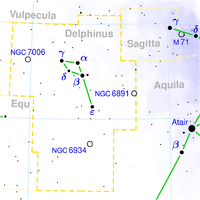
Dhanishta
Encyclopedia

: धनिष्ठा) is the twenty-third nakshatra
Nakshatra
Nakshatra is the term for lunar mansion in Hindu astrology. A nakshatra is one of 27 sectors along the ecliptic...
in Hindu astronomy, corresponding to α
Alpha Delphini
Alpha Delphini is a multiple star in the constellation Delphinus. It also has the name Sualocin, which was given to it as a practical joke by the astronomer Niccolò Cacciatore; the name is the Latinized version of his given name, spelled backwards.In Chinese, , meaning Good Gourd, refers to an...
to δ Delphini
Delphinus
Delphinus is a constellation in the northern sky, close to the celestial equator. Its name is Latin for dolphin. Delphinus was one of the 48 constellations listed by the 2nd century astronomer Ptolemy, and it remains among the 88 modern constellations recognized by the International Astronomical...
. It is also known as Dhanishtha or Avittam. In Jyotiṣa, Dhanishta is ruled by Mangala
Mangala
In Jyotish astrology, Mangala is the name for Mars, the red planet. Mars is also called Angaraka In Jyotish astrology, Mangala (Devanagari: मंगल) is the name for Mars, the red planet. Mars is also called Angaraka In Jyotish astrology, Mangala (Devanagari: मंगल) is the name for Mars, the red...
(the planet Mars
Mars
Mars is the fourth planet from the Sun in the Solar System. The planet is named after the Roman god of war, Mars. It is often described as the "Red Planet", as the iron oxide prevalent on its surface gives it a reddish appearance...
).
Dhanishta is classified as a Movable nakshatra, meaning that, under electional astrological
Electional astrology
Electional astrology, also known as event astrology, is a branch found in most traditions of astrology in which a practitioner decides the most appropriate time for an event based on the astrological auspiciousness of that time...
beliefs, it is best to begin activities like travel when the moon is in Dhanishta.
The deities which preside over Dhanishta are the eight vasus
Vasu
In Hinduism, the Vasus are attendant deities of Indra, and later Vishnu. They are eight elemental gods representing aspects of nature, representing cosmic natural phenomenon. The name Vasu means 'Dweller' or 'Dwelling'...
: Agni
Agni
Agni is a Hindu deity, one of the most important of the Vedic gods. He is the god of fire and the acceptor of sacrifices. The sacrifices made to Agni go to the deities because Agni is a messenger from and to the other gods...
, Prithvi
Prithvi
Prithvi is the sanskrit name for earth and its essence Prithivi Tattwa, in the form of a mother goddess or godmother. Prithvi is also called Dhra, Dharti, Dhrithri, meaning that which holds everything. As Prithvi Devi, she is one of two wives of Lord Vishnu. His other wife is Lakshmi. Prithvi is...
, Vāyu
Vayu
Vāyu is a primary Hindu deity, the Lord of the winds, the father of Bhima and the spiritual father of Lord Hanuman...
, Antariksha, Āditya, Dyaus, Chandramas
Chandra
In Hinduism, Chandra is a lunar deity and a Graha. Chandra is also identified with the Vedic Lunar deity Soma . The Soma name refers particularly to the juice of sap in the plants and thus makes the Moon the lord of plants and vegetation. He is described as young, beautiful, fair; two-armed and...
and Nakstrani.
The symbol most commonly used to represent Dhanishta is the drum known as the mridanga, and the flute.
Traditional Hindu given names are determined by which pada (quarter) of a nakshatra the moon was in at the time of birth. In the case of Ashvini, the given name would begin with the following syllables:
- Ga (गा)
- Gi (गी)
- Gu (गु)
- Ge (गे)

